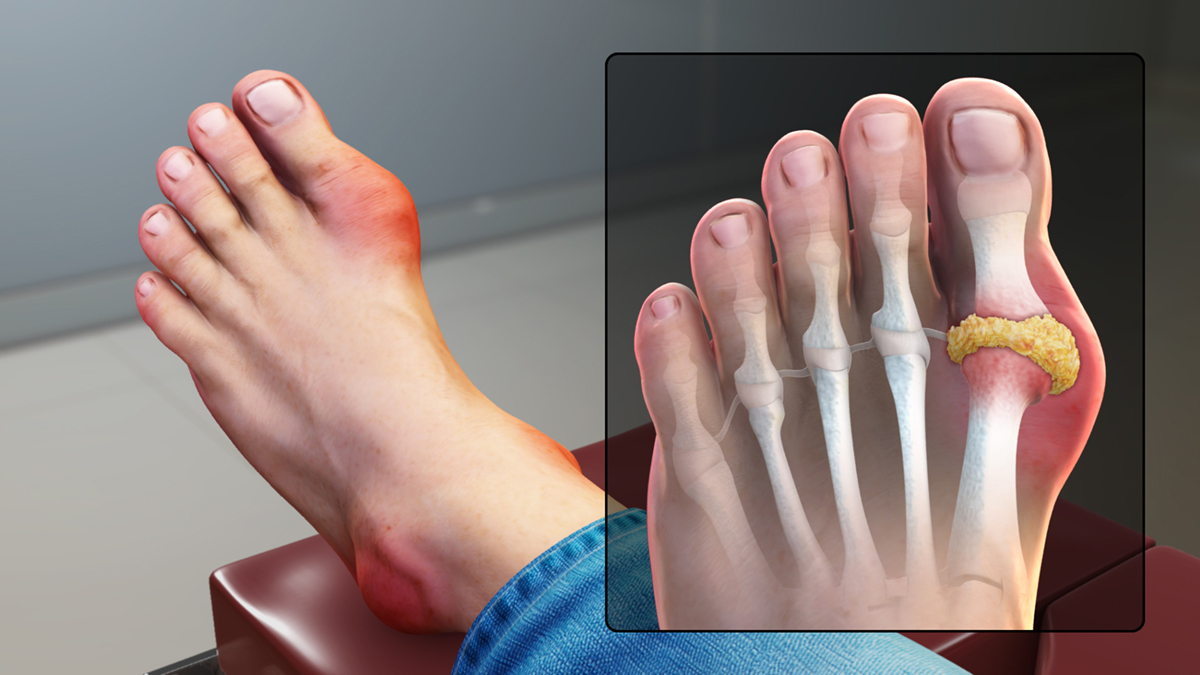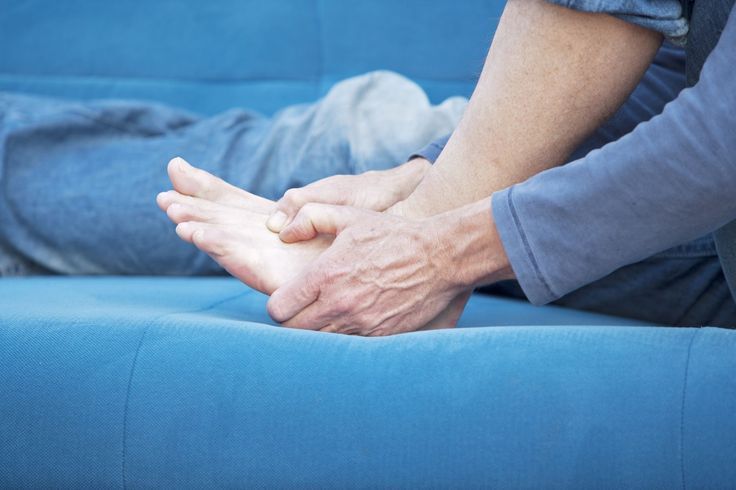Symptoms Never To Ignore With Gout
-
Gout is the most common kind of inflammatory arthritis, affecting some 8 million Americans. Gout attacks occur when uric acid builds up in the body and forms crystals in the joints, causing severe pain along with redness, swelling and tenderness. Certain symptoms associated with gout can indicate complications that should be assessed by a doctor.
The Four Stages Of Gout
Gout is best understood by seeing it as having four phases or stages :
Stage 1: High uric acid
Elevated uric acid without gout or kidney stone, this stage has no symptoms and is generally not treated.
Stage 2: Acute flares
This stage is marked by acute gout attacks causing pain and inflammation in one or more joints.
Stage 3: Intercritical periods
These are periods of time between acute attacks, during which a person feels normal but is at risk for recurrence of acute attacks.
Stage 4: Advanced gout
This is a stage of chronic gouty arthritis, in which there are lumps of uric acid, or tophi , frequent attacks of acute gout, and often a degree of pain even between attacks .
Figure 1: Stages of Gout
Figure 2: Illustration of Toe Joint with Gouty Tophus. normal toe joint Urate crystals, shown in white, at the “bunion joint,” represent a gouty tophus.)
Figure 3: Progression of Gout
When To See A Doctor
If you have tried on your own to revitalize your tired legs with exercise or rest, and you notice that theyre still dragging, see a doctor soon. It may not seem like a serious issue now, but if you and your doctor can diagnose the problem, you may be able to start taking steps toward feeling better very soon.
This article was originally published in 2018. It is regularly updated.
Read Also: What Foods Should You Avoid If You Have Gout
How Can A Gout Attack Be Prevented
Diet plays a key role diet in gout prevention: Since foods can directly set off gout attacks, patients with gout should receive counseling as to which foods are more likely to induce attacks. Losing weight is often also helpful. However, as important as diet is in gout, for most people with gout diet, and even weight loss, are not enough, and medications will be needed to get to their uric acid goal.
Fatigue Remedies That Address Inflammation Are Key To Getting Your Energy Back

A problem with inflammation could be the cause of your excessive tiredness.
As a doctor, I hear this question a lot. When a patient asks me, Why am I tired all the time? I think of inflammation. It may surprise you, as it does many of my patients, that you could have a problem with inflammation and not even know it, and that it could be the cause of your excessive tiredness. When there is fatigue, inflammation is usually the reason. Fatigue remedies that address inflammation are key to getting your energy back.
This type of inflammation is often described as silent, low-grade, chronic, and systemic because it is relatively mild and is present throughout the entire body for long stretches of time. Compare this to the kind of acute inflammation you would notice with, say, a severely sprained ankle, which is characterized by heat, redness, and swelling in the localized area around the ankle.
Also Check: Symptoms Of Gout In Feet And Toes
What Have Researchers Found About Medicines To Help Prevent Future Gout Attacks
Researchers found that:
- Allopurinol and febuxostat both lower the level of uric acid in your blood. One does not work better than the other.
- Allopurinol and febuxostat do not lower the risk of a gout attack in the first 6 months of taking either medicine.
- But, they do lower the risk of a gout attack after taking either medicine for 1 year.
What Other Drugs Will Affect Colchicine
Many drugs can interact with colchicine, and some drugs should not be used together. This includes prescription and over-the-counter medicines, vitamins, and herbal products. Not all possible interactions are listed in this medication guide. Tell your doctor about all medicines you use, and those you start or stop using during your treatment with colchicine. Give a list of all your medicines to any healthcare provider who treats you.
Recommended Reading: Does Acupuncture Help With Gout
How Will Gout Affect Me
Attacks can vary from person to person. Some people only have an attack every few years, while others have attacks every few months.
Without medication attacks tend to happen more often and other joints can become affected.
Having high urate levels and gout for a long time can lead to other health problems, including:
- narrowing of the arteries – which can lead to an increased risk of stroke or heart attacks or other heart problems
- osteoarthritis, which occurs when the urate crystals and hard tophi cause joint damage.
- an increased risk of developing kidney disease or worsening of the condition if you already have it
- kidney stones
- an increased risk of some cancers, especially prostate cancer
- mental health problems, including depression
- underactive thyroid
- erectile dysfunction in men.
If you take medication to lower your urate levels, and have a healthy diet and lifestyle, most of the damage and complications caused by gout can be stopped.
Treatments for gout are incredibly successful. There are two main parts to treating gout, which are:
- treating the acute attack
- treatments to prevent future attacks.
Is This Information Right For Me
This information is right for you if:
- Your health care professional* has said that you have gout.
- You are age 18 or older. This information is from research on adults.
* Your health care professional may include your primary care doctor, nurse practitioner, physician assistant, rheumatologist , orthopedist , or emergency room doctor.
This summary will answer these questions:
- What is gout?
- How is a gout attack treated?
- What have researchers found about medicines to treat a gout attack?
Don’t Miss: Over The Counter Gout Medicine Cvs
How Is It Caused
Gout is an autoinflammatory condition, which means the innate immune system becomes inappropriately activated. During an acute gout attack the presence of uric acid crystals in the joint leads to the release of IL-1 , a messenger of the immune system which triggers an inflammatory response.
Uric acid crystals promote the release of IL-1 in joints
Status: 2016-01-04
Want to help your child understand their illness ? Why not visit Kids Corner with your child and read Paula and Tim’s explanation of autoinflammatory disease and their experience of attending school and after school activities with their condition.
Why Do Gout Attacks Happen More At Night
Gout attacks happen more at night and in the early morning rather than during the day. You may have an attack start during your sleep. The reasons this happens are not entirely known, but some of the leading ideas are dehydration, lower body temperature, and changes in hormone levels during sleep. Talk to your doctor about ways to prevent gout attacks during your sleep.
Read Also: What Uric Acid Level Indicates Gout
Important Information About All Medicines
|
This medicine is for you. Never give it to other people even if their condition appears to be the same as yours. If you buy any medicines ‘over-the-counter’, always check with a pharmacist that they are suitable for you to take alongside your other medicines. If you are having an operation or any dental treatment, tell the person carrying out the treatment which medicines you are taking. Do not keep out-of-date or unwanted medicines. Take them to your local pharmacy which will dispose of them for you. If you have any questions about this medicine ask your pharmacist. |
How Common Is It

Gout is common in industrialised countries, especially in older adult men. In Europe, the number of people with gout ranges from 1-5 people in 100. Gout is most common in men over 40 years of age and in women after menopause. The number of people affected by gout has been on the rise for several decades.
Frequency of gout in various regions as before
Read Also: What Does Gout Feel Like In Your Feet
How To Get A Good Night’s Sleep With Gout
If you have ever been jolted out of a sound sleep with throbbing pain in your big toe, you know that a gout flare can make it impossible to get the rest you need. About 50 percent of gout flares begin in the toe, a condition called “podagra.” This gout pain usually starts at night and may be accompanied by fever and muscle aches. Even the weight of a sheet or blanket on your foot can be excruciating.
“Gout occurs when monosodium urate crystals precipitate in bones, joints, or soft tissues. These crystals are more likely to crystallize in lower temperatures. As it generally is colder at night, this may be why many gout attacks begin at night,” says Jennifer Sloane, M.D., a rheumatologist at Temple University Hospital in Philadelphia.
The sudden onset of pain in a single joint, with accompanying swelling, redness, and warmth around the joint, is such a classic symptom for a gout flare that most doctors can make the diagnosis over the phone. And, if you have had previous attacks of gouty arthritis, you know right away what’s happening.
Because gout pain can be quite severe, it is important to know how to quell it as fast as possible, usually by taking medication as soon as possible.
What Should I Think About When Deciding About Gout Treatment
You and your health care professional can decide what might be best to treat your gout attacks and help prevent future gout attacks. Here are some things to think about. Be sure to share your thoughts with your health care professional.
- How often do you have a gout attack?
- How do you feel about taking medicine to treat a gout attack?
- How do you feel about taking a medicine every day to help prevent future gout attacks?
- Which possible side effects concern you?
- How do you feel about trying other things, such as exercise, drinking plenty of water, and changing your diet to help prevent future gout attacks?
Ask Your Health Care Professional
- What problems can gout cause if not treated?
- Which medicine might be best to reduce pain and swelling when I have a gout attack?
- How can I help prevent future gout attacks?
- Might a medicine to lower the amount of uric acid in my blood help? If so, which one might be best?
- How long would I have to take the medicine?
- What side effects of the medicine should I watch for?
- Should I make any changes to my diet and alcohol use? If so, what specific changes should I make?
- Are there other things I can do that may help?
Read Also: Best Way To Keep Gout Away
Trying To Sleep Through Gout Pain
Gout can wake you from a sound sleep, and getting back to sleep without medication can be impossible. Here’s how to be well prepared.
If you have ever been jolted out of a sound sleep with throbbing pain in your big toe, you know that a gout flare can make it impossible to get the rest you need. About 50 percent of gout flares begin in the toe, a condition called “podagra.” This gout pain usually starts at night and may be accompanied by fever and muscle aches. Even the weight of a sheet or blanket on your foot can be excruciating.
“Gout occurs when monosodium urate crystals precipitate in bones, joints, or soft tissues. These crystals are more likely to crystallize in lower temperatures. As it generally is colder at night, this may be why many gout attacks begin at night,” says Jennifer Sloane, MD, a rheumatologist at Temple University Hospital in Philadelphia.
The sudden onset of pain in a single joint, with accompanying swelling, redness, and warmth around the joint, is such a classic symptom for a gout flare that most doctors can make the diagnosis over the phone. And, if you have had previous attacks of gouty arthritis, you know right away what’s happening.
What to Do for a Gout Pain Flare
Because gout pain can be quite severe, it is important to know how to quell it as fast as possible, usually by taking medication as soon as possible.
Here are the basics for treating a gout flare:
Can Poor Sleep Trigger a Gout Flare?
Why Does Atrial Fibrillation Cause Fatigue
Having spent the last 30 years of my career caring for people with atrial fibrillation, the number one symptom I hear is fatigue. Indeed, studies have confirmed that feeling tired is a hallmark symptom of atrial fibrillation.
As most of my patients with atrial fibrillation struggle with fatigue, here the top 5 reasons I have found as to why atrial fibrillation makes you so tired.
You May Like: Does Salt Cause Gout Flare Up
What Are The Symptoms
Aside from inflammation , acute gout attacks very quickly involve excruciating pain as well. After 8-12 hours, they reach their maximum intensity. Gout often occurs in the legs or feet and often affects a single joint, especially the large joint of the big toe.
Often people with gout also experience symptoms that affect the entire body, such as mild fever, chills and a feeling of being unwell. Left untreated, the most intense phase of the first attack usually lasts 3-4 days, with the pain gradually subsiding over the following 3-4 days. Typically with gout, the pain and inflammation disappear on their own.
Disease Activity And Fatigue
Fatigue and arthritis go hand in hand for many people with arthritis. The main culprits are the inflammatory disease process and the accompanying chronic pain.
- Inflammation. If you have an autoimmune disease, your immune system attacks your body and inflammation is the result. The body undergoes stress as it tries to cope with the release of inflammatory cytokines in the blood. That can cause fatigue, especially when disease activity is high or low-grade inflammation remains for a long time.
- Chronic Pain. The pain-fatigue connection can be a vicious circle. Dealing with arthritis pain for months at a time over many years can wear you down. It can affect your sleep habits, which adds to your exhaustion. Being fatigued, in turn, can worsen pain and make it more difficult to manage.
Read Also: Natural Remedies For Gout In Foot
Does Inflammation Cause Fatigue
So how can inflammation make you tired? Medical researchers have known for some time now that low-level inflammation over time is deleterious and is connected to diabetes, increased risk of cardiovascular disease, cancer and other chronic illnesses. Newer evidence also links chronic inflammation to chronic fatigue syndrome, depression, and general fatigue. In fact, there has been an explosion in recent knowledge of the pathways and mechanisms by which inflammation levels can influence your body, brain, and even your behavior, leading to fatigue.
Numerous studies show that chronically fatigued individuals have significantly higher blood markers of inflammation, such as the protein known as C-reactive protein and other pro-inflammatory compounds known as cytokines. In addition to general fatigue, higher levels of CRP and certain pro-inflammatory cytokines are associated with other symptoms linked with excessive tiredness, such as fatigue following physical exertion, as well as poorer physical performance and poorer self-rated health.
In addition to affecting the brain and nervous system, inflammation promotes fatigue through many biological pathways involving the immune system, mitochondria, oxidative stress, and the stress-response system known as the HPA axis. Each of these systems has been implicated in chronic inflammation and the symptom of excessive tiredness.
What Are The Stages Of Gout

- Hyperuricemia is a high level of uric acid. Hyperuricemia is not gout, but it increases your risk for gout. You may have no symptoms at this stage, and it usually does not need treatment.
- Acute gouty arthritis starts with a sudden attack of pain and swelling, usually in 1 joint. This may be in your big toe. The attack may last from a few days to 2 weeks.
- Intercritical gout is the time between attacks. You may go months or years without another attack. You will not have joint pain or stiffness, but this does not mean your gout is cured. You will still need treatment to prevent chronic gout.
- Chronic tophaceous gout develops if gout is not treated. Large amounts of uric acid crystals, called tophi, collect around your joints. The crystals can destroy or deform the joints. Gout attacks occur more often, and last hours to weeks. More than 1 joint may be painful and swollen. At this stage, gout symptoms do not go away on their own.
Read Also: Is Ice Cream Good For Gout
Which Joints Are Involved In Gouty Arthritis And Why Is It Most Common In The Foot
As with all other known types of arthritis, Gout has particular joints it tends to attack, and the foot is its most common location. Gout especially favors the bunion joint, known as the first metatarsophalangeal joint , but the ankle, midfoot and knee are also common locations, as is the bursa that overlies the elbow.
The bunion joint is the first joint involved in 75% of patients and is ultimately involved in over 90% of those with this condition. . It is thought that this joint is especially involved in gout because it is the joint that receives the highest pounds per square inch of pressure when walking or running.
Late in gout, if untreated, multiple joints can be involved, including the fingers and wrists. The shoulder joint is very rarely involved by gout and the same is true of the hip.
Figure 5: Location of Gout Attacks